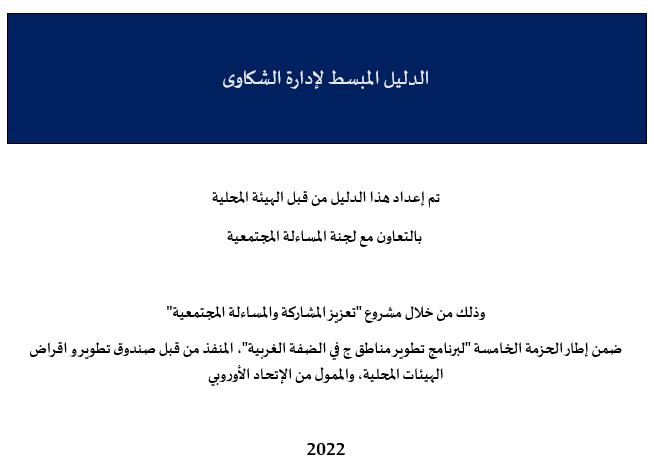Many local government bodies across the West Bank have developed disclosure plans and procedural manuals in order to deal with complaints from local authorities in different regions across the West Bank. The objectives of these plans are to enhance transparency, and foster participation, as well as social accountability. These government bodies used the framework of the “Strengthening Accountability and Community Participation” project, which was used to implemented the fifth package of the “Development of Area C” program in the West Bank, to guide their operations. This development project is supported by the Municipal Development and Lending Fund (MDLF) and funded by the European Union. The social accountability committees SACs and technical assistance teams of the Association for Community Development and Continuing Education Institute (CDCE-I) worked alongside the local government bodies in order to enhance these disclosure plans and procedural manuals.
The stakeholders involved in this project held several meetings, where they discussed the development strategies for the disclosure plans and procedural manuals in the target communities. The local government bodies fully supported the development strategies of these plans and manuals, as these plans and manuals are considered to be the solid foundation that will foster cooperation, and strengthen partnerships between local government bodies and the Social Accountability Committees. Ultimately, this will have a positive impact on all levels of society.
Ms. Amal Qaraqe, the Vice President of Wad-Rahal Village Council, stated that the development of the disclosure plan and the complaint procedures manual is an important step that needs to be taken in order to lay a solid foundation for social accountability and a strong partnership between local government authorities and members of the community. Qaraqe hopes that these plans and manuals will foster a sense of transparency in the community, provide full disclosures, teach community members to accept constructive criticism, and provide local governments a blueprint for dealing with complaints in a professional manner.
The term “disclosure” is defined as a set of procedures and activities that allow citizens to become more aware on the work of local government bodies. An important aspect that must be induced in all disclosures is transparency. These disclosures include creating structural plans and informational newsletters that will provide citizens with information that would be of interest to them, and this may include information on how to access certain services. These structural plans and informational newsletters with also highlight important information about the financial status of local authorities.
These disclosure plans aim to help local authorities achieve numerous goals. It primarily focuses on enabling the local community (which includes citizens and government bodies) to be more
confident in the operations of the local government bodies. In addition to this, the disclosure plans will enhance the accessibility of important information that would pertain to citizens, institutions, and other parts of society. Most importantly, these plans promote integrity, transparency, and accountability.
It is important to note that this project will target 15 municipalities and village councils in six governorates located in the West Bank. These governorates provide various services to the residents of Area C, and distributed to the following municipalities: Hebron (Al-Ramadeen Municipality, Al-Karmel Municipality, As-Semia Municipality, Um Addaraj Village Council), Bethlehem (Janatah Municipality, Municipality Za’tara, Wadi Rahal Village Council, Alkhader Municipality), Jerusalem (Al-Ezariya Municipality), Tulkarm (Shoufe Village Council), Qalqilya (Qalqilya Municipality, Jensafout Village Council), Jenin (Beir Al Basha,East Aba and Zabdah Al Jadeda Village Councils). The project will span the duration of 18 months.






